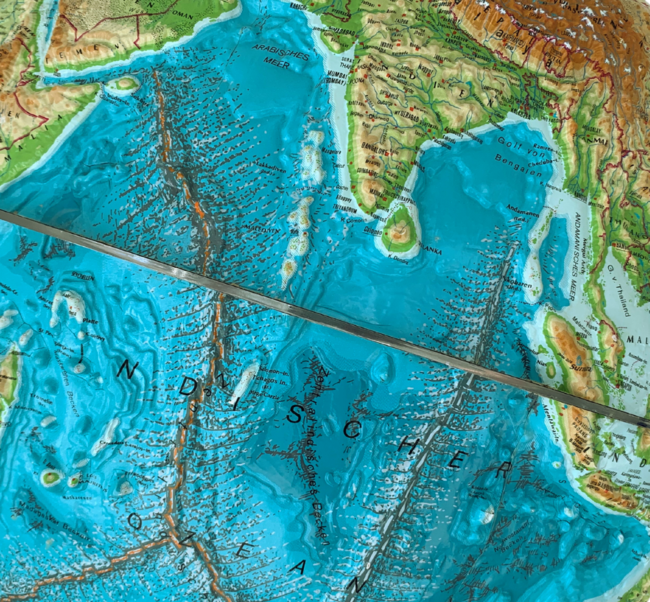30/07/2024 | Earth system modelling will be a focus at ZMT over the course of the summer with a recently launched seminar series on the topic. Scientific director Raimund Bleischwitz has invited renowned experts in the field to give talks at ZMT.
Hailing from Hereon, PIK, ETH, Ruđer Bošković Institute or Southampton University and others, the scientists will cover a wide range of modelling topics ranging from to the ocean climate nexus, coastal ecosystems, earth system modelling or nutrient fluxes.
It follows on the heels of ZMT strategic research extension on 'Modelling socio-economic dimensions across Tropical Coastal Ecosystems and the Earth System - TropEcS' which positions ZMT more directly as a key player in the modelling of the tropical coastal climate, the impact of climate change on human populations at these coasts, and the development of response strategies.
The seminar series takes place on Wednesdays from 12:00 (midday) at ZMTs’ large seminar room and online via Zoom (Link: https://us02web.zoom.us/j/88963632392?pwd=6PtsrWnfjVLK7j9bYHtonKenaeRhMb.1)
Here is an overview of the first talks:
1 July, 12am - 1pm
Dr. Clea Lumina Denamiel, Ruđer Bošković Institute, Division for Marine and Environmental research.
This talk will be on Modelling challenges and perspectives in the ocean/climate nexus along questions and topics of relevance and interest for ZMT (What's at stake for coastal regions in light of increasing weather extremes and other impacts; Downscaling climate models to regional scales: what's missing and possible advancements; Modelling perspectives from a regional view: forecasting, digital twins, addressing data gaps; Implications for adaptive response strategies in coastal planning).
24 July, 12am - 1pm
Title: Coastal ocean CO2 uptake and climate feedback variability
Dr. Moritz Mathis, Hereon, Earth System Modelling,
Abstract: The coastal ocean is a dynamic environment connecting the land and ocean as the two primary sinks in the global carbon cycle. Quantifying coastal carbon fluxes is thus relevant for understanding the controls of the Earth´s climate and addressing impacts of climate change mitigation efforts. Yet, ongoing global carbon budgeting initiatives highlight the need for further investigation of the land-ocean transition zone to constrain uncertainties in carbon burial, transport and air-sea gas exchange. I will present the global ocean-biogeochemistry model ICON-Coast, which seamlessly integrates the coastal ocean in marine carbon cycle modeling. Results from hindcast simulations provide insights into the main drivers of the increasing CO2 uptake of the coastal ocean. I will show that biological responses to climate-induced circulation changes and riverine nutrient inputs are key to the enhanced coastal uptake, and lead to a net CO2 flux density that is higher than in the open ocean. However, coastal climate feedback mechanisms, such as the loss of Arctic permafrost organic carbon due to increasing coastal erosion, regionally modulate the air-sea CO2 exchange and its interannual variability. These results emphasize the importance of understanding region-specific dynamics of the marine carbon cycle to comprehend and predict drivers and impacts of global climate change.
31 July, 12am - 1pm
Title: Insights into coupled Earth-system modelling and perspectives on applications in regional coastal tropical systems
Dr. Georg Feulner, PIK, Earth System Analysis
21 August, 12am - 1pm
Title: Modelling marine biogeochemical extreme events: Distribution, characteristics and impacts
Abstract: Marine biogeochemical extreme events, associated with ocean warming, deoxygenation and acidification have been observed to increase in their frequency, intensity and spatiotemporal extent, with the 2014-2016 North Pacific Blob an example for a severe and long-lasting compound extreme event. Potentially acting as harbingers of future climate change, these extremes are associated with substantial changes in marine ecosystem composition and functioning. Here, we use regional and global marine ecosystem and Earth System models to understand the drivers, distribution, characteristics and impacts of biogeochemical extremes over the historical time period. Using pteropods as an example study taxon, we discuss a range of habitat-based, ecological and physiological metrics to quantify and attribute impacts on marine ecosystems.
Dr. Meike Vogt, ETH Zurich, Department of Environmental Systems Science
27 August, 12:00 - 13:00
Titel: Making microbes part of the equation
Prof. Dr. Sinikka LennartzProf. Dr. Sinikka Lennartz, University of Oldenburg
Abstract: The ocean hosts an enormous diversity of microorganisms, which are the main drivers of biogeochemical cycles and control major carbon reservoirs. However, their influence on marine biogeochemistry is not yet adequately represented in global ocean models. This shortcoming reduces our ability to project biological feedbacks in future scenarios. In this talk, I will present examples of how we connect field observations, experiments and theory to inform biogeochemical model development with a focus on dissolved organic carbon (DOC) and microbial interactions. Our results so far have highlighted that microbial processes determine the distribution of DOC on basin-scales, and are closely linked to the cycling of macronutrients. Taking these microbial influences into account suggests that the marine DOC pool may be much more variable than previously thought. The close linkages to nutrient cycles also have potential implications for a future, more stratified ocean, in which nutrient concentrations are projected to decline. By using a microbial community model, we show that nutrient concentrations may influence the balance between cooperation and competition in microbial communities, which impacts the partitioning of dissolved and particulate organic carbon.
28 August, 12am - 1pm
Title: The impact of future climate at the seabed
Dr. Lucy Bricheno, National Oceanographic Centre, Marine Systems Modelling
Other Wednesdays or other days tend to be filled spontaneously due to the summer season and the varying absences of candidates who are eligible for the series.





